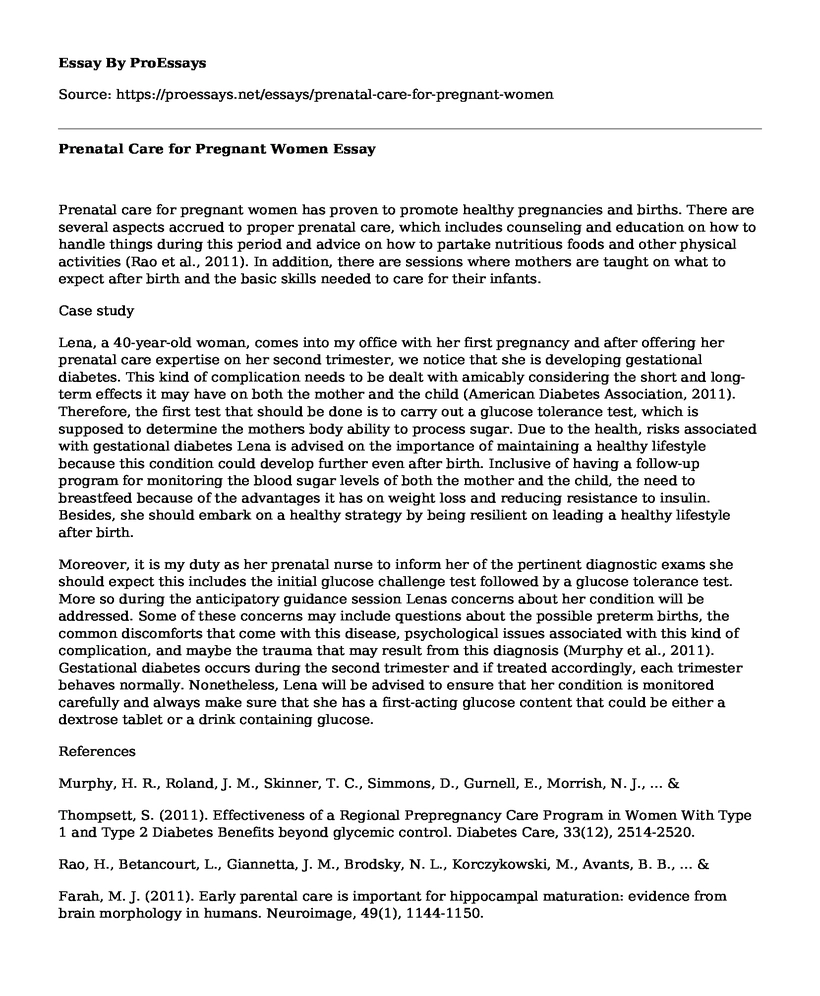Prenatal care for pregnant women has proven to promote healthy pregnancies and births. There are several aspects accrued to proper prenatal care, which includes counseling and education on how to handle things during this period and advice on how to partake nutritious foods and other physical activities (Rao et al., 2011). In addition, there are sessions where mothers are taught on what to expect after birth and the basic skills needed to care for their infants.
Case study
Lena, a 40-year-old woman, comes into my office with her first pregnancy and after offering her prenatal care expertise on her second trimester, we notice that she is developing gestational diabetes. This kind of complication needs to be dealt with amicably considering the short and long-term effects it may have on both the mother and the child (American Diabetes Association, 2011). Therefore, the first test that should be done is to carry out a glucose tolerance test, which is supposed to determine the mothers body ability to process sugar. Due to the health, risks associated with gestational diabetes Lena is advised on the importance of maintaining a healthy lifestyle because this condition could develop further even after birth. Inclusive of having a follow-up program for monitoring the blood sugar levels of both the mother and the child, the need to breastfeed because of the advantages it has on weight loss and reducing resistance to insulin. Besides, she should embark on a healthy strategy by being resilient on leading a healthy lifestyle after birth.
Moreover, it is my duty as her prenatal nurse to inform her of the pertinent diagnostic exams she should expect this includes the initial glucose challenge test followed by a glucose tolerance test. More so during the anticipatory guidance session Lenas concerns about her condition will be addressed. Some of these concerns may include questions about the possible preterm births, the common discomforts that come with this disease, psychological issues associated with this kind of complication, and maybe the trauma that may result from this diagnosis (Murphy et al., 2011). Gestational diabetes occurs during the second trimester and if treated accordingly, each trimester behaves normally. Nonetheless, Lena will be advised to ensure that her condition is monitored carefully and always make sure that she has a first-acting glucose content that could be either a dextrose tablet or a drink containing glucose.
References
Murphy, H. R., Roland, J. M., Skinner, T. C., Simmons, D., Gurnell, E., Morrish, N. J., ... &
Thompsett, S. (2011). Effectiveness of a Regional Prepregnancy Care Program in Women With Type 1 and Type 2 Diabetes Benefits beyond glycemic control. Diabetes Care, 33(12), 2514-2520.
Rao, H., Betancourt, L., Giannetta, J. M., Brodsky, N. L., Korczykowski, M., Avants, B. B., ... &
Farah, M. J. (2011). Early parental care is important for hippocampal maturation: evidence from brain morphology in humans. Neuroimage, 49(1), 1144-1150.
American Diabetes Association. (2011). Diagnosis and classification of diabetes mellitus.Diabetes care, 33(Supplement 1), S62-S69.
Cite this page
Prenatal Care for Pregnant Women. (2021, Mar 11). Retrieved from https://proessays.net/essays/prenatal-care-for-pregnant-women
If you are the original author of this essay and no longer wish to have it published on the ProEssays website, please click below to request its removal:
- Hospital Risk Management: A Case Study of Hospital for Special Surgery (HSS)
- The Role of Various Growth Factors in Preventing the Schwann Cell Impairment in Surgical Peripheral Nerve Repair
- Investigating Causes of an Unknown Disease - Essay Sample
- Social Determinants of Health in Violence Against Essay
- Eclampsia: Causes, Risk Factors, & Seizures in Pregnant Women - Essay Sample
- Health Care System Needs Improvement for Patient Safety - Essay Sample
- Essay Sample on Old Age: Access to Quality Healthcare Services







